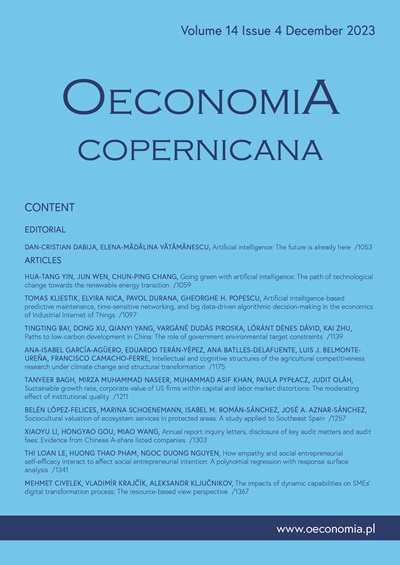Post-Brexit exchange rate volatility and its impact on UK exports to eurozone countries: A bounds testing approach
IF 10.8
1区 经济学
Q1 ECONOMICS
引用次数: 1
Abstract
Research background: The Brexit referendum had a profound effect on the economic relations between the United Kingdom (UK) and continental Europe. Major economic and financial determinants were affected, including the impact of the GBP/EUR exchange rate volatility on the dynamics of UK exports to the Eurozone. Purpose of the article: This paper seeks to assess the extent to which these dynamics have changed since Brexit and to estimate the magnitude of their impact. Methods: To this end, the volatility behavior of the GBP/EUR exchange rate before and after Brexit is captured using EWMA, GARCH(p,q), and EGARCH(p,q) models for the period of January 1, 2010 to August 31, 2020. The post-Brexit change in the volatility structure of GBP/EUR exchange rates is then tested by including a dummy in the optimal volatility model. Finally, the Autoregressive Distributed Lag (ARDL) Bounds Testing approach is employed to analyze the relationships between exchange rate volatility and exports. Findings & value added: GARCH(1,1) was selected as the winning model and used to examine the volatility structure of the post-Brexit exchange rate, which revealed no significant change. By incorporating a well-grounded proxy for exchange rate volatility into the demand function of exports, and controlling for the industrial production index, terms of trade, and real exchange rate, the analysis showed that exchange rate volatility had a negative impact on export volume to the Eurozone in both the long and short run. Additionally, the industrial production index had a positive effect on export volume in both the long and short run, while an appreciation in the value of the pound relative to the euro adversely affected the competitiveness of UK exports in the Eurozone market in the long run, with no impact in the short run. This paper serves as a benchmark for future studies, as it follows a three-step modeling approach and provides valuable insights into the potential economic and financial consequences a European Union (EU) member state may face should it choose to exit the EU.英国脱欧后的汇率波动及其对英国对欧元区出口的影响:一种边界测试方法
研究背景:英国脱欧公投对英国与欧洲大陆的经济关系产生了深远的影响。主要的经济和金融决定因素受到影响,包括英镑/欧元汇率波动对英国对欧元区出口动态的影响。本文目的:本文旨在评估自英国脱欧以来这些动态变化的程度,并估计其影响的程度。方法:为此,使用2010年1月1日至2020年8月31日期间的EWMA、GARCH(p,q)和EGARCH(p,q)模型捕捉英国脱欧前后英镑/欧元汇率的波动行为。然后通过在最优波动率模型中包含一个虚拟人来测试英国脱欧后英镑/欧元汇率波动结构的变化。最后,采用自回归分布滞后(ARDL)边界检验方法分析汇率波动与出口之间的关系。研究结果与增加值:GARCH(1,1)被选为获奖模型,用于检验英国脱欧后汇率的波动结构,结果显示没有显著变化。通过在出口需求函数中加入一个有充分根据的汇率波动代理,并控制工业生产指数、贸易条件和实际汇率,分析表明,汇率波动对对欧元区的出口量在长期和短期都有负面影响。此外,工业生产指数在长期和短期内对出口量都有积极影响,而英镑相对于欧元的升值在长期内对英国出口在欧元区市场的竞争力产生不利影响,短期内没有影响。本文可以作为未来研究的基准,因为它遵循了三步建模方法,并为欧盟成员国选择退出欧盟可能面临的潜在经济和金融后果提供了有价值的见解。
本文章由计算机程序翻译,如有差异,请以英文原文为准。
求助全文
约1分钟内获得全文
求助全文
来源期刊

Oeconomia Copernicana
ECONOMICS-
CiteScore
13.70
自引率
5.90%
发文量
26
审稿时长
24 weeks
期刊介绍:
The Oeconomia Copernicana is an academic quarterly journal aimed at academicians, economic policymakers, and students studying finance, accounting, management, and economics. It publishes academic articles on contemporary issues in economics, finance, banking, accounting, and management from various research perspectives. The journal's mission is to publish advanced theoretical and empirical research that contributes to the development of these disciplines and has practical relevance. The journal encourages the use of various research methods, including falsification of conventional understanding, theory building through inductive or qualitative research, first empirical testing of theories, meta-analysis with theoretical implications, constructive replication, and a combination of qualitative, quantitative, field, laboratory, and meta-analytic approaches. While the journal prioritizes comprehensive manuscripts that include methodological-based theoretical and empirical research with implications for policymaking, it also welcomes submissions focused solely on theory or methodology.
 求助内容:
求助内容: 应助结果提醒方式:
应助结果提醒方式:


